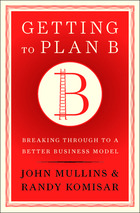Here’s a rundown of some recent business books I read (or started):
Confessions of a Public Speaker, by Scott Berkun
Verdict: thumbs up
Jan Schultink recommended this book and I enjoyed it. The book has enough useful substance, and a healthy dollop of humor, to get my vote. By this point, I’ve done a fair amount of public speaking to audiences ranging from the tens to the thousands. A lot of Berkun’s points resonated true.
In particular, I wanted help understanding my nervousness before speaking. It’s incredibly irritating, but my body starts giving me an upset stomach even when I am confident about my content, preparation, and audience; even if I’m doing something as simple as joining a panel of 5 other people. It all disappears the minute I open my mouth, but I hate that waiting period before you can talk. In one situation before a huge NRF keynote, I copied some of my off-broadway acting friends (who will do crazy, fun stuff to amp themselves before a show, like roaring at each other like lions). In this case, I literally jumped around backstage like Tigger. I probably looked silly to the A/V techs and organizers back there, but it worked and it helped me deliver a good talk.
Berkun demystified subconscious “stage fright” for me in a very helpful way, and for that alone the book was worth it. He has good tips on how to work a tough room, the importance of preparation, and how to deal with things that go wrong. Yes, some sections are better than others, but overall I think this book is worth it.
Addendum: I couldn’t agree more on the importance of preparation. One of my career moments of shame was being asked to speak to a bunch of Fidelity business units about virtual worlds. The date of the talk was right smack in the middle of a crucial and intense product launch. I was completely focused on my team and customers, and ignored the talk until the last minute. I know I did a crappy job, was extremely pissed at myself, and swore from there on out that I would always properly prepare, and only accept a speaking request if I knew I had the time to treat it properly.
![]()
Getting to Plan B, by John Mullins and Randy Komisar
Verdict: Couldn’t finish

Plan B cover
I was really hoping to like this book, because Komisar is an impressive guy. It contains some good ideas around documenting your assumptions, dashboarding your results & metrics, and what Eric Ries calls the pivot.
Here was my problem: entrepreneurs like blogs from Mark Suster and Chris Dixon not because those guys can write a check (although that helps), but because you can tell that these guys have been there in the trenches. My impression of Getting to Plan B was that it was written mostly by the business school professor, not Komisar, and the combination of language, the examples they chose, and what felt like filler just turned me off. I have never had patience with books written by academics, and this was no exception.
![]()
The Speed of Trust, by Stephen M. R. Covey
Verdict: Couldn’t finish

Speed of Trust
A tweet from someone I respect led me to try this book, so clearly they enjoyed it, but I personally failed to see the value of the read. I have a pretty strong opinion about ethics, the value of trust and relationships in business, and even quit a job because I didn’t like the ethics of what I was being asked to do. As I waded into the book, I felt like I was merely reading platitudes and faux-science on the value of trust in relationships. Frankly, I don’t think anyone who believes in setting aside their ethics for a fast buck is going to be much influenced by this either — for that kind of person, when blood is in the water, all these issues go out the window. My patience ran short at page 77.
